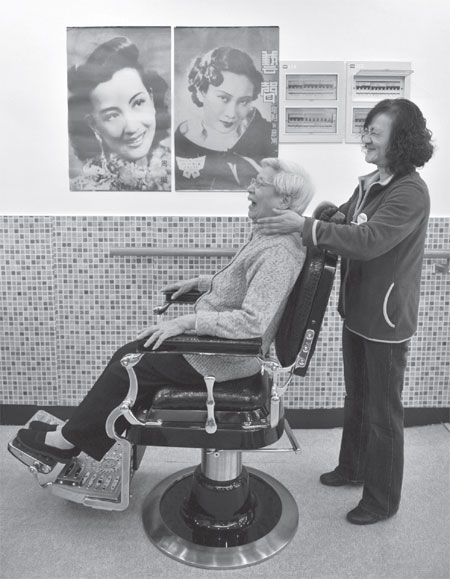Nursing home demand spurs investment
Updated: 2014-04-18 11:40
By Li Yang in Shanghai (China Daily USA)
|
|||||||||
In China, many services and industries that have for years been controlled by the government will become big markets when control is released. Caring for the elderly is one of them.
By tradition, elderly Chinese are supposed to live at home with their children. However, the family-planning policies enforced since the 1980s and the freedom to move across the country enjoyed by farmers since 1976 have already left many empty-nest elderly who live apart from their only child.
As of last year, China had nearly 200 million senior citizens above 60, half of whom lived alone. Overall, the elderly population is expected to rise to 250 million, nearly 20 percent of the national total in 2020.
Today, China needs more than 10 million nursing home beds for the elderly, but has only 5 million.
Foreign investors saw this market well ahead of their Chinese counterparts.
Companies from the United States, Europe and Japan started building nursing homes in the form of holiday inns in big cities like Shanghai as early as the 1990s.
US-based Holiday Retirement Corporation invested in a center for the affluent retired in a suburb of Shanghai in 1998. But the project became a holiday inn in 2006.
The timing may have been a little early, because the accelerated aging of the Chinese society did not come until years later, and the government had not yet openly welcomed foreign capital in the "gray" industry.
German Augustinum Group's retirement home project in Shanghai in 2006 was also a failure, mainly because of difficulties in buying land from the local government.
Dozens of Japanese and German nursing home companies planned to start similar projects in the coastal city of Qingdao, Shandong province, in 2007. The lack of relevant support policies and difficulty buying land sent them home empty-handed.
However, the government's attitude changes with its balance sheets.
The rising demand for pensions - especially after including 800 million farmers in the basic social security system - leaves the government no further resources to establish a national nursing home network.
Finally in mid 2013, the China central government decided - in a working conference presided over by Premier Li Keqiang - to open the elderly nursing home market to investors at home and abroad.
The conference statement recognized private capital's important role in caring for the rapidly aging Chinese population.
Before that, there were already some sporadic Sino-foreign joint ventures providing medical services, consulting and holidays for rich Chinese elderly in big cities.
The government's green light whetted foreign investors' appetite for the big market. Yet they still needed to do their homework on how to best access the right groups of customers after the government unveiled a practical set of rules and policies.
In 2012, the professional nursing and medical care investment company Columbia Pacific Management and retirement house management firm Emeritus Senior Living jointly started the first foreign venture Cascade Healthcare in Shanghai and Beijing.
Half of Cascade's beds in Shanghai are still empty today. Project manager Zhang Fan said, "It takes time for the Chinese to accept professional nursing for the elderly in place of home care."
The presence of professional foreign nursing homes is transforming care for the elderly from a family tradition into a business.
Still, a significant inflow of foreign nursing homes has yet to come. Investors still hold a wait-and-see attitude for the feasibility of future government policies, especially in land acquisition and taxes.
The current administrative systems and rules were established in a planned economy decades ago for non-profit, mostly government-funded agencies.
Under these circumstances, it becomes a challenge for private investors in for-profit nursing homes to get along well with various levels of administrations.
"They just turn us off with the excuse that there is no policy for us," said one investor.
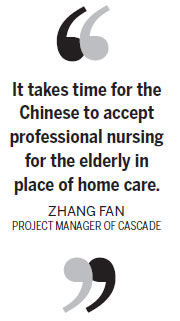
A year has passed since the central government welcomed foreign capital to the market, yet there are still no specific rules or policies on the books to transform the welcome into tangible business opportunities.
Professional nursing for the elderly costs money. It features disease prevention, rehabilitation training and tailor-made comprehensive nursing, and differs from the temporary nursing services in Chinese cities, which are undertaken by middle-aged jobless women, and female migrant workers at much lower prices.
Most of the nursing homes look like holiday hotels. Monthly costs range from $1,311 to more than $5,000.
The average monthly pension for an urban Chinese varies $300 to around $2,000, and a farmer's monthly pension is about $8.33.
Even after the elderly Chinese mortgage their houses, as the Shanghai government advocates, their earnings from commercial pension insurance still pale in contrast with high nursing home costs.
Preferential policies for private for-profit nursing homes could encourage more investors at home and abroad to provide more diversified and competitive services for the elderly of different income levels.
Zhang Fan, vice-director of social welfare at the Shanghai civil affairs bureau, said: "We will not distinguish between foreign and domestic agencies caring for the elderly with preferential policies, if any."
Analysts think that a clear-cut set of rules and guidelines would also distribute supervisory duties clearly among the civil affairs, commerce and business administrations, as well as public health departments.
"An open and well-supervised environment promotes healthy development of the burgeoning industry," Zhang Fan noted. "The Chinese nursing enterprises can better learn management experience from foreign companies to better serve the elderly."
liyang@chinadaily.com.cn
|
A woman gets a massage at a day care center for the elderly in Shanghai. Xinhua |
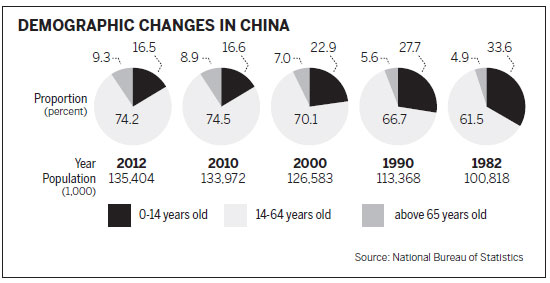
(China Daily USA 04/18/2014 page6)
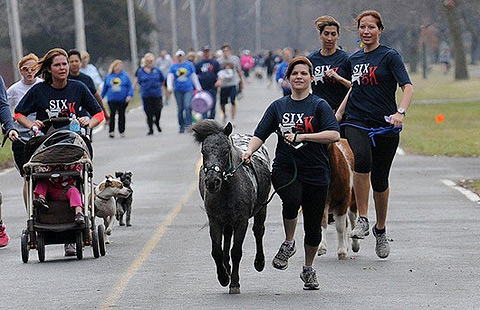
 Runners and their 4-legged friends race in New York
Runners and their 4-legged friends race in New York
 Top 10 Chinese Internet firms eyeing IPOs in US
Top 10 Chinese Internet firms eyeing IPOs in US
 Chinese cop cadets learn about US police work
Chinese cop cadets learn about US police work
 In Boston, warming up for, remembering marathon day
In Boston, warming up for, remembering marathon day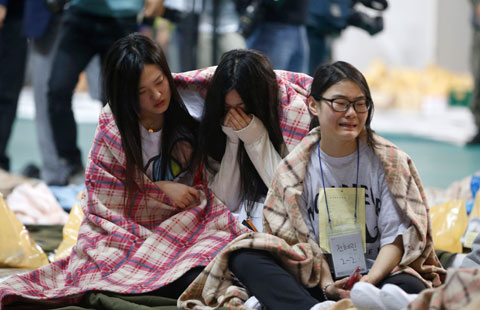
 Families of missing passengers face agonising wait
Families of missing passengers face agonising wait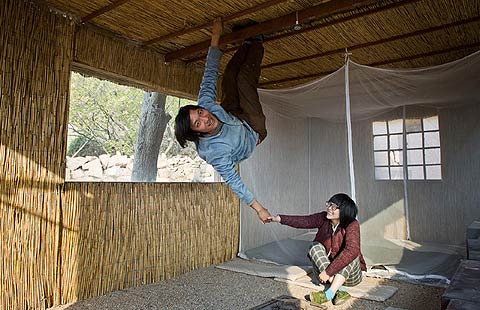
 Couple leave the city for 'Self-sufficiency Lab'in mountains
Couple leave the city for 'Self-sufficiency Lab'in mountains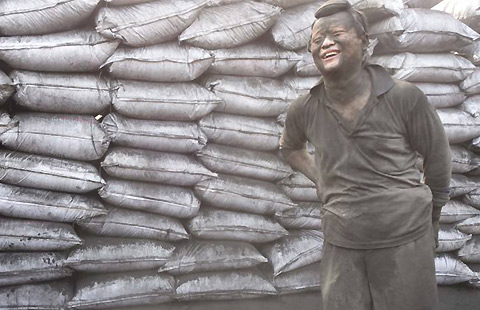
 Turning waste into something valuable
Turning waste into something valuable
 Dignitaries put their foot down
Dignitaries put their foot down
Most Viewed
Editor's Picks

|

|

|

|

|

|
Today's Top News
Scientists discover most earth-like planet
UN celebrates 2014 Chinese Language Day
4th US Navy official charged in bribery scheme
Nobel winner Marquez dies at 87
Chinese keen on Google Glass
Ferry's captain under probe
Texas seizes polygamist group's secluded ranch
In Boston, people remembering marathon day
US Weekly

|

|
